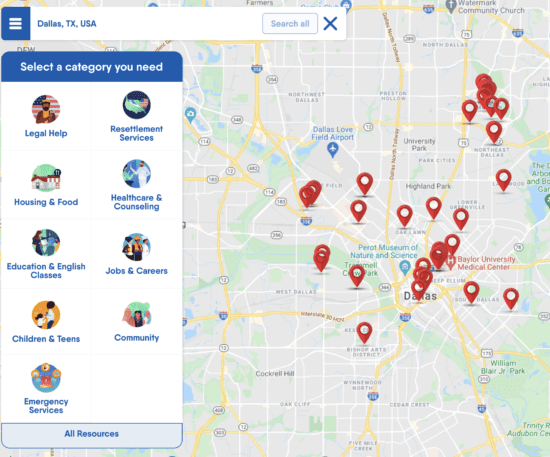How to find a job in the United States
Are you looking for a job? Find 10 helpful tips on how to find a job. Know how to prepare your information and where to look for job opportunities. Learn about job centers, job fairs, and ways to gain more experience.
Tips to help you find a job
1. Gather your information
Before you start your job search, gather all of your information. This will help you know what type of job you can apply for in the United States. This can include your:
- Work history – the name, dates, and location of where you worked along with your responsibilities
- Work skills – general skills you can use at any job (being on time, learning quickly) and work-specific skills (operating machinery)
- Education or training – name and location of the school you attended. Include any training you have. You may want to get your degree evaluated so it’s recognized in the U.S.
- Languages – often immigrants know more than one language and this can be valuable to an employer
- Professional references – these are people who you have worked with in the past and that can speak positively about your experience
- Proof you can work in the USA – certain documents show you can work in the U.S. such as a passport, green card, or social security card. An employer should never keep your documents.
Depending on the job you are looking for, it is good to prepare a resume and cover letter. Some jobs don’t need a resume, but keeping a list of your job information is still helpful.
2. Consider what jobs are a good fit for you
Take time to understand different job titles and job descriptions. What work experience and education do you need for them? Look for words like “needed,” “required,” and “must-have” to make sure you have the experience or education for the job.
3. Search for job opportunities online
One of the easiest ways to look for jobs is by searching online.
You can visit a company website and look for openings. Job search engines can also help you search for a job by location, experience, and even salary. The most popular job search engine website pages are Upwork, Glassdoor, LinkedIn, Indeed, USJobs, Snagajob, Care, and many others.
Some job search websites have the option for you to create a profile and sign up for job alerts. Most of these websites will require you to build an online resume before applying to a listed position.
If you need to improve your computer skills, there are free classes and resources to help you.
| Be aware of scams. Employers will never ask you to pay to get a job. You should also be careful giving out personal information, like your social security number or credit card. |
4. Share you are looking for a job with your community
Your family and friends can connect you with employers. Share with them that you are looking for a job, and ask for recommendations. You can speak to your neighbors and other people in your community. These are all people part of your “network” which is a support system to find opportunities and build relationships.
Employers trust the recommendations of their employees. And, it can give you an advantage over other candidates.
5. Look for opportunities in your neighborhood
Look for “Help Wanted” signs in your neighborhood. This means they are looking for employees. Introduce yourself and ask about the jobs available. You might need to fill out a paper application.
Local newspapers and websites could be a good starting point. Follow the local news and check local community boards. Check companies near you and see who is hiring.
6. Sign up at an employment center
Employment centers offer free help to find a job. They also offer services such as job counseling, resume assistance, and access to computers. You can search for employment centers and other support on FindHello. Click “Jobs & Careers”.
If you are a refugee, your resettlement agency can help you look for a job and provide some of these services.

Find legal help, English classes, health clinics, housing support, and more. Search a local map and list of services for immigrants in the USA with the app FindHello.
7. Contact companies directly
If you want to work for a specific company, but don’t find any openings online, you can email or call them. You won’t always get a response but you may get helpful information on upcoming opportunities. Some might even offer a meeting.
When you contact a company, make sure to:
- Ask for the Human Resources department or the person in charge of hiring.
- Introduce yourself and explain why you are calling.
- Be ready to answer questions and provide information.
- If you can’t talk to a hiring manager, ask for an email address to send your resume.
8. Attend job fairs and networking events
Job fairs are events where different companies provide information about job opportunities. You can usually talk directly to people who help with hiring for the company.
Networking events bring different people together who work in related jobs to talk and learn from each other.
Ways you can prepare for these events include:
- Make copies of your resume or create a QR code to easily share.
- Dress nicely.
- Have talking points and questions prepared.
- Don’t be shy. Introduce yourself and explain why you are there and the position you are looking for.
9. Get more experience with training programs or volunteering
Sometimes you need more experience for the job you want. Some employers also want to see that you have experience in the USA.
Get free training
The U.S. government offers free online training and employment programs.
Apprenticeship.gov: Opportunities to get paid work experience in different industries.
H1B Skills Training Grants: Help to get employment in growing industries.
Job Corps: Nationwide training program for people ages 16 through 24.
YouthBuild: Training and education programs for at-risk youth ages 16 through 24.
CareerOneStop: Job opportunities and training.
Volunteer or intern
Becoming a volunteer or intern can help you get experience. You may not get paid, but you can get training, new skills, and find professional references. Sometimes, a volunteer position or an internship can lead to a paid job.
10. Apply to more than one job at a time
It is important to apply to as many different jobs as you can to increase your chance of being hired. Applying for a job does not mean getting an interview or getting hired.
Apply to jobs you know you can and are willing to do.
Don’t get discouraged
It can take time to find the right job. Keep looking even if you haven’t had success. You can ask an employer why you did not get hired. Sometimes you will get honest feedback that can help you make improvements.
Your life experiences and your ability to adapt to change are valuable and can be an asset to many employers.
Other resources
We aim to offer easy to understand information that is updated regularly. This information is not legal advice.


